#반말
Text
Cute capybara 사랑해
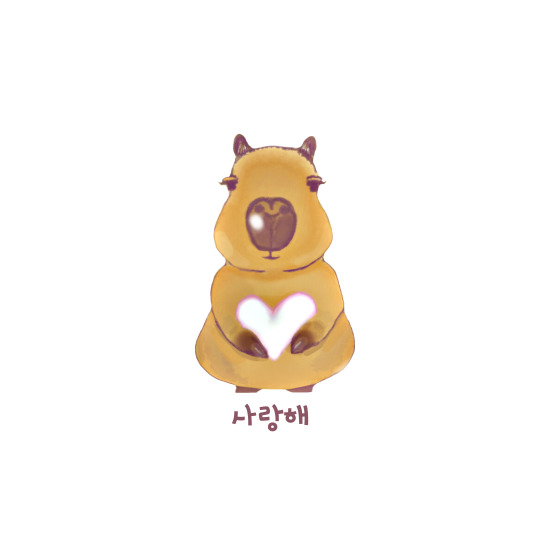
For those who are interested in Korean language:
"사랑해" means in Korean "I love you", it's very informal and intimate way to say due to 반말 (a plain language you use between friends/lovers, people that you know and they are in the same age/younger)
In Korean language, depending on the level of intimacy, age gap, work/school hierarchy, you use 반말 or 존댓말.
In case you want to sound more polite, feel free to use
"사랑해요"
(adding -"요" changes 반말 into 존댓말 - a polite, honorific language)
#cute art#digital aritst#redbubbleshop#kawaiicore#learn korean#korean words#korean#반말#존댓말#korean grammar#capybara art#capybara#capybara meme#digital art#capyposting#kpop#stray kids#bts#bts army#south korea#kawaii aesthetic#artists on tumblr
42 notes
·
View notes
Text
[1일 1포 - 19/28]
야자타임
This is a sort of "game" where everyone drops formalities and uses 반말 (informal speech uses "야", "자" endings, hence 야자-time).
So during 야자타임, instead of calling someone ㅇㅇ 씨, 선배님, 쌤... you'd just call them ㅇㅇ아, 야, 너 and drop the 요/습니다 endings.
It's usually done while drinking, but it also comes up on variety shows and things like that because it's funny to break the social hierarchy sometimes. But if you play it with people you usually speak formally to, try not to get carried away because some people might hold a grudge if they felt you were too rude ㅋㅋ
I was reminded of this game cause I saw this trailer for a new youtube show called 야자타임 with some male celebrities. (Seems like the first 2 episodes are out, if you're looking for some unscripted listening practice!)
youtube
#langblr#listening practice#language learning#studyblr#Korean#존댓말#반말#korean language#study Korean#feb 1일 1포
8 notes
·
View notes
Text

Korean Speech Levels & Titles
What are Korean honorifics?
They are ways of speaking in Korean that communicate the relationship between the speaker and the subject or the listener. Korean has this built into the language with special words, titles, and grammar.
Korean has different speech levels. These levels are demonstrated in the verb endings. The speech levels that are used most often are formal speech, polite/casual speech, and Informal speech. You may also see them listed as high, middle, and low.
Korean Honorifics
Korean honorifics can be thought of as a special speech level. In Korean culture, respect is given high importance in everyday life. This is evident in the Korean language. Koreans use honorific language to communicate respect between the speaker and the subject/listener. Honorifics are used to communicate relative positions in a hierarchy. Typically Korean honorifics are used to show respect to someone higher in the hierarchy or a person who holds a high social status.
Formal & Polite
The formal speech level is used when you’re speaking to someone older than you, someone who holds a higher position than you, or someone who belongs to a higher social hierarchy. Sentences using the formal speech level usually ends with ~ㅂ니다.
The polite speech level or also known as the standard speech can be used in most situations. You can use this speech level when you’re speaking with people you know, but don’t have a close relationship with them. Sentences using this speech level usually end with 요.
Informal speech level
The informal speech level or also known as casual speech can be used when you’re speaking with people with who you have close relationships such as friends and family. This is also the speech level you can use with those younger than you or of lesser seniority.
Korean Speech Levels vs Honorifics
Korean speech levels can be thought of as politeness levels. Typically they are verb endings that demonstrate the formality of a situation. For example, you might use an informal speech level with friends, someone the same age as you, or someone younger than you. You would use the standard speech level for everyday communication. You could use the formal version when giving a speech or a news broadcast. You can use different speech levels to talk about yourself.
Honorifics are used to show respect to the listener or the third person you’re talking about. Honorifics are usually special words (nouns, verbs, verb endings, pronouns, etc) used to show respect. Korean honorifics are typically used for speaking to someone older than you or higher than you in the social hierarchy. You cannot use honorifics to talk about yourself.
What are Honorific Terms in Korean?
Honorific terms in Korean are special titles, words, and verbs that are used to refer to people older than you or higher than you in the social hierarchy.
Honorifics in Korean
The word “honorifics” in Korean can be expressed in 2 ways. The first one is 존댓말. The other word for “honorifics” in Korean is 높임말.
존댓말 is about how you convey or show respect in your sentences while 높임말 is about the choice of respectful words you use in your sentences. 반말 can be translated as the use of informal or casual speech.
KOREAN SUFFIXES
님 = a high-level honorific used to show respect to someone. This suffix is used with people’s names and titles. Koreans can call you using your full name or first name + 님. That is a common way to address someone with respect.
You’ll see the 님 suffix added to job titles. A common 님 usage is with the title of teacher - 선생님.
씨 = used to address people that are roughly on the same level of the social hierarchy. (slightly older or younger than you) An example of this might be two students in class.
This is used with a person’s name + 씨. For example, your classmate is named 배지훈. You address your classmate as 지훈 씨.
아/야 = used with people who are close to you and younger. The format used is name + 아/야. If the name ends in a consonant, then you’ll use name + 아. ㅑIf the name ends in a vowel, then you can use name + 야.
KOREAN TITLES:
오빠
- Literal meaning: “older brother”
- Is also used to call: A male friend or a male sibling who’s older than you (as a female)
- Is used by: A younger female to call an older male friend or sibling
형
- Literal meaning: “older brother”
- Is also used to call: A male friend or a male sibling who’s older than you (as a male)
- Used by: A younger male to call an older male friend or sibling
언니
- Literal meaning: “older sister”
- Is also used to call: A female friend or a female sibling who’s older than you (as a female)
- Used by: A younger female to call an older female or sibling
누나
- Literal meaning: “older sister”
- Is also used to call: A female friend or a female sibling who’s older than you (as a male)
- Used by: A younger male to call an older female or sibling
선배
- Literal meaning: “senior”
- Is used to call: A female or male student who’s older than you at school/university
- Used by: A younger female or male student
- Example: If you’re a senior at a university and your friend is a freshman, you’re 선배 to them.
- Opposite word of 선배 is 후배
후배
- Literal meaning: “junior”
- Is used to call: A female or male student who’s younger than you at school/university
- Used by: An older student to call someone who’s younger than him/her
- Example: If your friend is a freshman at a university and you’re a senior, your friend is 후배.
동생
- Literal meaning: “younger sibling”
- Is used to call: A younger male or female sibling or any friend who’s younger than you (as a female/male)
- Used by: An older male/female or an older sibling to one who’s younger than them
- Side note: You don’t use this word when you call them. Call them by name.
여동생
- Literal meaning: “younger sister”
- Is used to call: A younger female sibling or any female who’s younger than you (as a female/male)
남동생
- Literal meaning: “younger brother”
- Is used to call: A younger male sibling or any male who’s younger than you (as a female/male)
Why Do Koreans Use Honorifics?
This hierarchical culture is followed strictly. Not only just for differences in status but differences in age as well: even a 1-year age difference is considered enough to warrant honorificity.
In many situations, you will see Koreans become overjoyed when they learn that their conversation partner is the same age.
This is because they can speak freely and comfortably to people of the same age, so they will refer to each other as 친구 (chingu, meaning friend), even if they are not close. But if their conversation partner is older, they must use a more polite and formal way of speaking. If they don’t, it could be thought of as disrespectful, embarrassing, or socially insensitive.
You’ll also see 아/어 드리다 in place of 아/어 주다.
The structure of the first phrase is: verb stem + 아/어/여해드릴게요. This is commonly used to tell someone that you will do something for them. You can translate it to “I will do … for you.”
If you form this phrase as a question, it will be: verb stem + 아/어/여해드릴까요?
This is commonly used to ask someone if they would like you to do something for them? It translates to “Shall I do … for you?”.
#한국어#korean langblr#study korean#korean language#korean lesson#koreanspeechlevels#koreanpolitnesslevels#반말#오빠#언니#누나#형#learn korean#korean titles#what does 후배 mean?#what does 선배 mean?#동생#한국어 공부
20 notes
·
View notes
Note
DO YOU SPEAK KOREAN. ARE YOU A KOREAN REYLO BC OH MY GOD SO AM I
ㅋㅋㅋ 미안한데 한국 사람이 아니라 미국사람이에요
보다시피 한국말 할 수 있는데 아직 유창하지 않아요 ㅠㅠ
한국에 가본 적은 2번 있고 어느날 한국 대학원에서 국어학을 전공할 생각이에요 ^^
만나서 반가워용~~
1 note
·
View note
Note
생일축하해요 누나 !! i had no idea it was your birthday,,,, (i have no idea if i got the honorifics right either) but i hope youre alright! :) and i hope the rest of your day goes well!!!! <3
다 맞았어, 걱정마! 💞 thank you lovely! it was a good day, got my ass kicked in bowling and billiards and watched a horror film and had the best time lmaooo 😌 I'm 21 now I feel old as hell help
생일 축하해줘서 고마워! 사랑행~💞
#bringing out the aegyo no one is safe not even in 반말 xoxo#mutuals#leo 🦁💞#yes ur a lion i am basic ty
4 notes
·
View notes
Video
youtube
[쇼츠라인 & 연예가스타] "저리 비켜" 레드벨벳 조이, "Get out of my way". Red Velvet's Joy, #...
#youtube#Get out of my way. Red Velvet's Joy 저리 비켜 레드벨벳 조이 SBS 직원에 '반말+고함' 갑질 당해 그룹 레드벨벳의 조이가 갑질 피해를 입은 것으로 알려졌다. 그런데 조이가 팬들에게 다가서자 누군
0 notes
Video
youtube
[스타쇼츠 & 연예가소식 ] "저리 비켜" 레드벨벳 조이, SBS 직원에 '반말+고함' 갑질 당해..,#스타쇼츠 #소상공인마켓 #...
#youtube#저리 비켜 레드벨벳 조이 SBS 직원에 '반말+고함' 갑질 당해 그룹 레드벨벳의 조이가 갑질 피해를 입은 것으로 알려졌다. 그런데 조이가 팬들에게 다가서자 누군가 갑자기 어딜 들고나가냐
0 notes
Note
당신의 직업은 무엇인가요 🥹👀 You never tell me anything anymore…. 💔
나는 웨이터다 … y no te digo nada porq. nunca me mandaste un mensaje ???? no es mi problema 🤭
#i just know you ran the korean through a trnslator😭#girl i love you but you are terrible at language learning…#✨.|| inbox.🔒#✨.|| asks.🔓#✨.|| user; septabuspass#pero te amo maxie❤️#‘당신’ …아니…#just use 동생 for me … n use 반말 .. stop the formalities im younger than u
1 note
·
View note
Text
more context for 악어(acau)'s translation (troubles? future troubles?)!
@blockgamepirate mentioned pronouns in context of translation in a reblog and that got me thinking about a bunch of things lmao but mostly about 반말 (banmal).
악어 decided really early on into his experience with the translator to try to use banmal bc he felt like the translator was picking up on it better, and he probably thought this because of two things:
banmal is usually shorter than 존댓말 (jondaemal) which is the polite/default way of speaking. and when i say default i mean my parents sometimes use it to refer to each other. it's more than just politeness, it's also a certain amount of respect? with younger people (high school, college, maybeeee graduate student age) people tend to use banmal with friends. older people use banmal to talk to children, and children use banmal except when talking to older people. i think the easiest way of showing just how much shorter banmal is, is to use "안녕" (korean "hello") as an example. "안녕" (annyeong) is actually banmal! you absolutely wouldn't say this to someone you've just met - you would say "안녕하세요" (annyeonghaseyo) which is jondaemal. but do you see how the second is three syllables longer? there's more of a margin of error with three more syllable and that's why the machine translator doesn't work as well with jondaemal.
The most casual way of speaking banmal uses pronouns. korean doesn't have gendered pronouns really, and the pronouns it does have seem. rude? generally? children use pronouns a lot and adults use pronouns when speaking to children but otherwise.... if you're not friends (and young honestly have yet to find an midsized (40+) adult regularly use pronouns) calling someone "you" is like. an insult. it works (that is, it doesn't feel like an insult) in 악어's stream for me because it felt like he was speaking in a significantly simpler/slower register after a while? like the register you'd use for kids. but i did want to put it out there! because if you're trying to learn korean through 악어's stream, you're probably listening to him use banmal! and that's just something to be aware of.
more pronoun thoughts! in terms of gender - korean doesn't have gendered pronouns. the closest you get in third person is something like "that girl" so machine translate will almost never get it right. it will default to masculine (in my experience) or the first person ("i" "me") so that's something to keep in mind. honestly my dad often defaults to masculine third person pronouns because he forgets pronouns are gendered in english and that there's more than one of them lmaooo. korean does gender relationships A Lot (oppa is the one that most people will know - brother from female speaker to older male listener) but pronouns wise there's. no gender oop.
i just wanted to put this out there because as 악어 becomes more a part of the qsmp community, we'll probably slowly pick up on the more regular patterns of awkward machine translation from an east asian language to english, and more specifically from korean to english. and if it's confusing that's ok! assume good faith - 악어 from what i can tell isn't a streamer who'll use insults a lot or curse, and his normal way of speaking to his audience is very soothing/polite/jondaemal, so i hope that people keep watching him throughout this introduction period!
#qsmp 악어#qsmp acau#qsmp translations#korean language#honorifics#cultural difference!#in the language!#qsmp korea
412 notes
·
View notes
Text
im back w more additions to tyun and noona gf dynamic as a korean ! i’ve already discussed formal speech/jondaemal and how that’s kinda 🤭 when used during sex especially from a younger guy…especially if the younger guy is TAEHYUN😮💨😮💨😮💨
but i also wanna mention now that in korea there’s this thing called 반존대/banjondae which is a combination of 반말/banmal/informal speech and 존댓말/jondaemal/formal speech.. its hard to explain in english but basically the younger guy (in this situation taehyun) would say something formally like, “noona, do you have plans this weekend?” (누나 주말에 뭐할거예요?) and then in the next sentence switch to informal speech like, “spend time with me.” (나랑 놀자.) SO THE APPEAL IS LIKE. BEING SUPER RESPECTFUL AND POLITE IN THE FIRST SENTENCE AND THEN SWITCHING IT UP AND BEING MORE DIRECT/FLIRTY IN THE NEXT!!!
and when i tell you this can be employed so well during sex FUCKKK like. imagne u being a brat and taehyun has to punish you and of course being the well mannered, gentle dom leaning guy he is he starts off still speaking to you formally.. that in itself is already hot, having him get all rough and stern with you while still using jondaemal, the way he’s speaking formally with u still cuz ur his noona but he is most definitely in charge here 😭😭🤭
but youre totally testing him today because little by little you start acting up more.. wiggling around when he tries giving you punishments, talking back, being rude… eventually when hes just trying to open you up with his fingers he grabs you by the waist with both hands and hauls you over his lap and youre just dumbfounded when he slides a hand over your ass and briefly dips his fingers into your dripping cunt.. and fuck taehyun’s still so polite, murmuring, “hang in there for a bit, noona.” (누나 좀만 있어요.) right before he slaps ur ass realll hard 😖😖 tyunnie doesnt hold back with his punishments huh 🥺 and he only makes it worse by following up his sweet words with a sharp tug of your hair and him hissing out, “you’re soaking wet, huh? you like it? you’re in big trouble.” (아래 존나 젖었네 응? 좋아? 너 큰일 났다.) SHDHSGAFAHSHSGWGW
309 notes
·
View notes
Text
Love for Love's Sake | Things You Didn't Notice #4 | Fight with Homophobes
Honestly, I wanted to dissect these scenes right away but then we got the rest of the show uploaded and the emotions overshadowed me. But now we're diving into informal Korean speech, swearing and slurs! It's going to be a fun post, let's go :D
Disclaimer: I'll be writing down both English and Korean slurs strictly in educational manner, obviously.
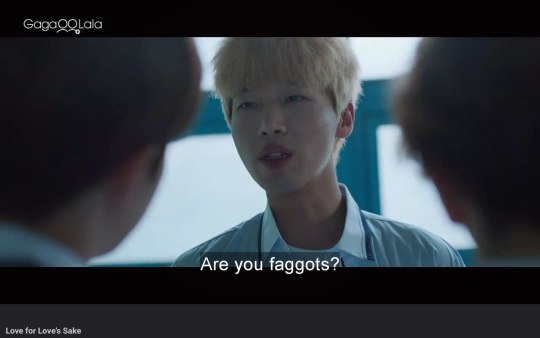
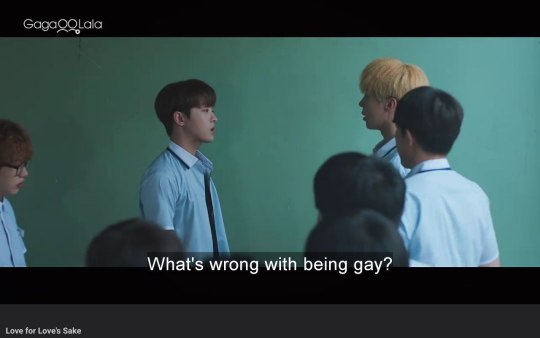
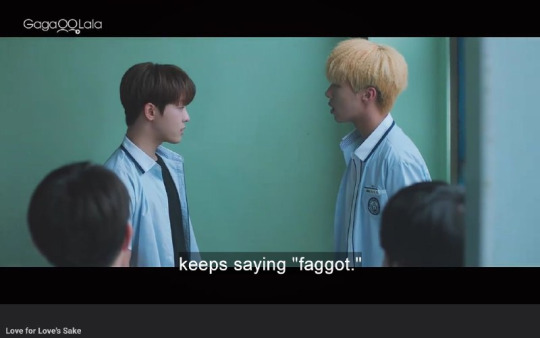

"Fuck. You two are always so fucking close together. (to Myungha) Are you also a faggot (homosekki)? Wow, Kyunghyun's skills are so good."
"Why are you so vulgar? What's wrong with being homo?"
"You're really crazy. Are you criticizing me?"
... (Myungha kisses Tak Junho)
" Ah fu— You damn faggot!"
"We both kissed. I'm not the only one who's homo. You're homo too~"
"You did it yourself, you faggot!"
"Ah, our Junho keeps saying 'homo'. Tss, slurs are forbidden."
"Shut up, you faggot."
"If you call me homo one more time, I can steal your lips for real. (Junho is silent) Ha, afraid you'll be robbed?"
Honestly, I like the translation in subs this time, I just wanted to give you a more technical version (and to show you the difference, because in Gaga subs the f slur is also used by Myungha but it's not exactly that)
So, as far as I noticed, the slur in Korean is a derivative from the term "homosexual" - thanks to the similar sounding, it became "homosekki" (from sekki - asshole, bastard, bitch etc). This is the word Junho keeps using in almost every sentence. And the socially accepted common term is now "gay" (at least, the cast and couple from Korean reality dating show "His Man 2" refers to themselves as 'gay' and not 'homo').
Myungha uses the original term, just "homo", which also gained a negative connotation but doesn't include a 'sekki' swearword. So he keeps saying "homo" to talk back in the language Junho used, only less derogatory. We'll see later but it's amazing, because both Myungha and Sangwon confidently used this word about themselves (Sangwon even went further and proudly reclaimed the slur itself).
Still, Myungha did threaten gangster Junho not to even call him "homo" or any similar terms. And here's the moment which made me laugh: in the next scene with Sangwon, Junho was angry ranting about Myungha, but he caught himself using the slur "homosekki" and quickly changed to the modern and neutral term "gay". LOL
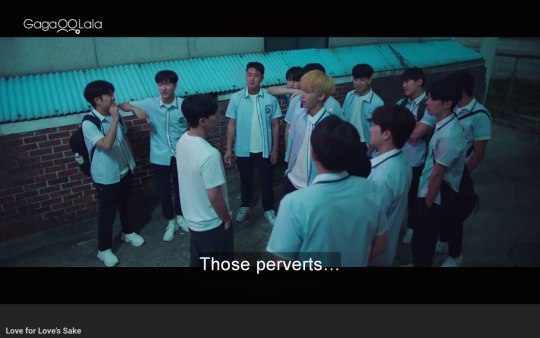
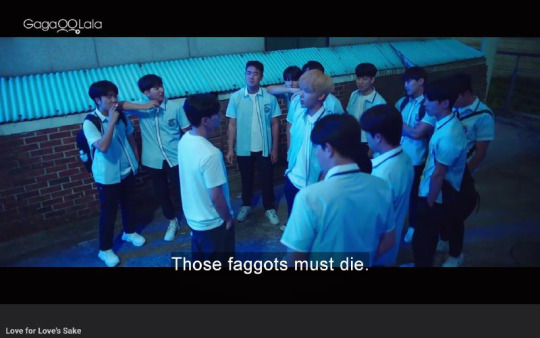

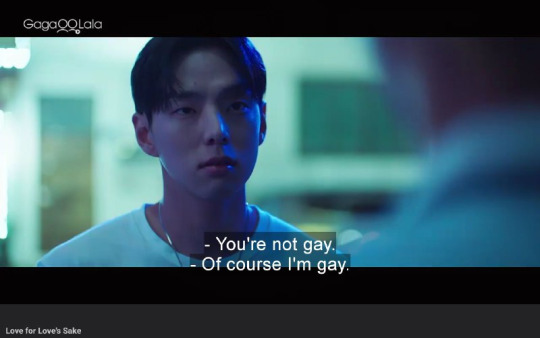
Which is what Gaga subs failed to show it to us. Again, let's see more technical translation:
"I'll go after Tae Myungha and Ahn Kyunghoon soon, just so you know. Those fa– Those gay bastards must die. That fucker Tae Myungha kissed me in the lips, shit. Isn't it fucked up? It was disgusting."
(Sangwon, pouting) "Wow, really? It must've been nice."
"Jeez, you asshole. You're not a victim so you dare talking shit."
"I'm being serious, though?"
(Junho, appalled) "What the hell are you talking about? You're not a faggot."
"I am a faggot, though?"
One, why is it so funny that the first reaction Sangwon had, hearing about Myungha kissing someone in a fight, was: awww :( i wish it was me :((( you so lucky :((
Second, it's hilarious how the gangster ends up the ONLY person who ever uses nice and modern term "gay" once in this show because our protagonists both hit him back with the derogatory terms (Sangwon even attached the slur to himself, when he only liked girls before falling in love with Myungha at first sight, what a legend).
Let's wrap it up with slurs and check out another small detail: informal speech in Korean.
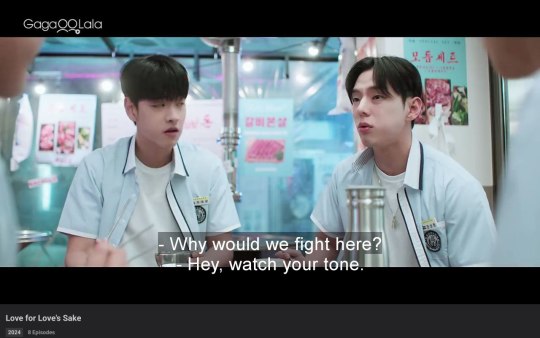

(Sangwon to Myungha)"Why would we fight here?"
(Yeowoon to Sangwon)"Hey, watch your tone (don't use informal speech)"
"Was I talking like that with you?"
"Talk curt (informally) only with me."
"I'm already being curt (talking informally) with you."
This one is definitely a cultural thing that always gets lost in translation (but "being curt" is a nice way of putting it). There are two general styles of speech in Korean: Formal (존댓말, jondemal) and Informal (반말, banmal). Of course, it's a lot more complicated in the language, but I'll paint briefly the differences that are pointed out in the scene.
I talked in previous posts about properly addressing your senior in korean (usually by title/position). To convey respect to your senior, you also use 요 (yo) at the end of the sentences – and both Sangwon and Yeowoon talk politely to Myungha. UNTIL Sangwon uses the rude version of a question, without polite ending ("Why would we fight here?"), to which Yeowoon protests and tells Sangwon that it's banmal, informal speech, and he should only use it with him.
Because with your friends, same age people (Yeowoon and Sangwon in this case) or people younger than you, it's normal to use their names with different intonations (Think Myungha's "Yeowoon-ah, Yeowoon-ie") and talk informally.
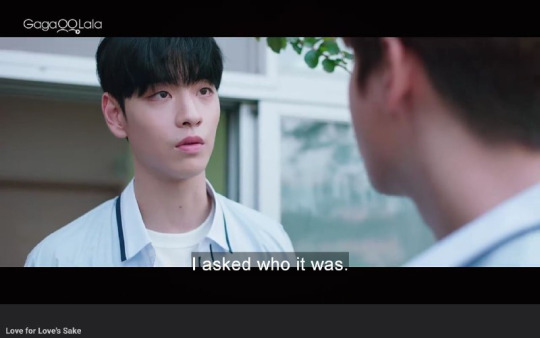

(Yeowoon to Myungha) "I asked who it was."
"You're being curt (that's an informal speech)".
Fast forward – Yeowoon loses patience and demands Myungha "I asked who it was", question without polite ending as well. To which Myungha cheekily says "that was an informal speech", reminding Yeowoon of his own remark to Sangwon.
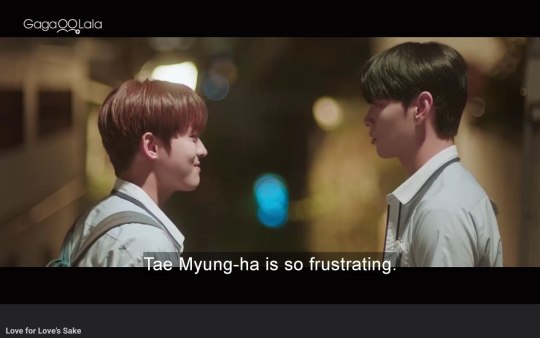

Fast forward again – and now I have to take back my previous statement from another post that Yeowoon never called Myungha by his name because I found the rare case of him doing it xD
"Tae Myungha is so frustrating."
"You're speaking informally more often these days."
Again, a youngster! calling his senior! by his own name! Not using the polite ending! The horrors of informal speech. He's not being too rude but he's sulking therefore he's rebelling. Though I can swear, again, Yeowoon hears Myungha's scolding and resorts back to speaking politely, and from now on, he'll keep using 'senior'.
If you survived until the end of this post, congratulations! The second half probably wasn't needed but in case you're learning Korean or you want to know why these seemingly normal phrases are being considered "curt" out of nowhere, I hope you understand it now a little bit better :)
// Previous messages translation + other language moments here //
#love for love's sake comments#watch me writing my own course Learning Korean with Kdramas on tumblr#but that fight dialogue scene was just perfect i couldn't resist#the exchange and usage of different terms was funny and the scene was hilarious on its own#sangwon and myungha are my heroes#love for love's sake#love for love's sake meta#bl meta#korean bl#korean drama#love supremacy zone#dropthemeta#korean language#linguistics#language
166 notes
·
View notes
Text
"Jimin and Jungkook's casualness isn't anything out of the ordinary but is still surprising"
'지민 (Jimin) Choreography Practice Sketch' write-up ✍️

Among Jimin's gruesome practice sessions and strict work ethics leading up to Face promotions, we were given a peak into a few moments out of Jungkook's visit on day 2.
What struck me (and even k-armys) is that they didn't even bother to pretend to be formal in front of the staff and camera + crew, which just goes to show how long gone are their age barriers in communication and behavior. Once again I know we are all well aware of this development between them, however it is still a bit surprising seeing that happen in front of strangers- especially at their workplace and during work, which is a formal setting. The significance of this may appear minimal to you but in Korean culture, the way you talk to someone but also what you discuss and how you phrase it is highly influenced by the age hierarchy. Allowing someone speak to you informally (even in the public or formal settings) means they now have the same rank as you and their word is thus referred to/significant on the same level as yours and they can express things way more directly. In a highly hierarchical culture with a strong respect for authority (or anyone above) this presents a disruption in an embedded way of thought and behavior that is in the minds of all Koreans from the very early age. 반말 (banmal) of course does happen among many people even those who are not 친구 (friends- meaning people born in the same year) but it is not something that is just expected automatically and in any social setting. (I am excluding family ties here)
Thus, what the international audience may see and perceive only reading the translated subs:
"Ah cool, Jungkook came and supported Jimin"

What the Korean audience (or anyone with just a little knowledge of the language and culture) sees and perceives:
"Oh wow they are speaking informally so naturally to each other, they seem so close"
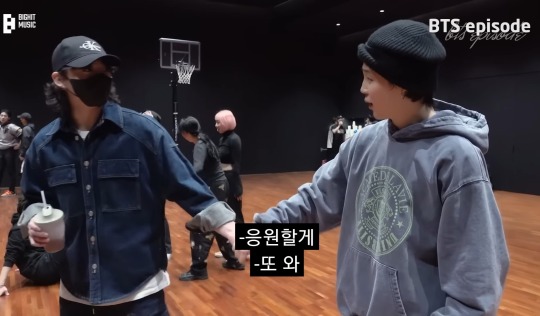
JK: "I'll cheer for/ support (you)"
(*said in a form that implies promise to someone for the future, informal tone)
JM: "Come again"
(*said as an informal command or request)
Other fav moments:

JK: "Noo, do it once (for me)!"
(*주다 on its own means to give, gift someone something; in combination with other verbs like 하다 (to do) it implies doing something for someone; the most accurate but weird way in English to translate would be: "give a doing" Here Jungkook commands/requests Jimin to do the dance for him in an informal tone which sounds veeery casual, especially considering the dancers nearby 🫣)

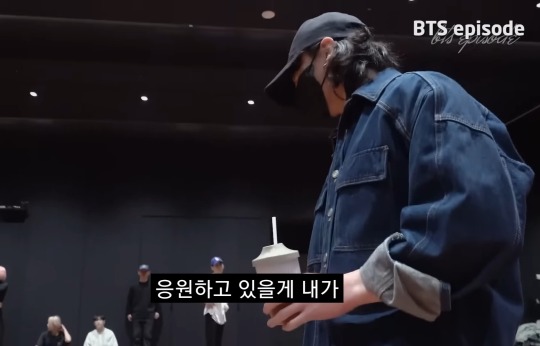
JK: "It's awesome/ You're awesome"
(*Again informal tone, the pronouns are not stated therefore both you/it could be inserted)
JK: "Will be cheering (for you), myself"
(Informal tone, said in a form that implies promise to someone for the future + Jungkook added 내가 at the end of the sentence to emphasize he personally will be cheering/supporting Jimin on. Reminder- Korean sentences don't need pronouns, therefore you can tell he used it for added emphasis)
All in all, Jungkook didn't use the formal level a single time besides when he was leaving and told Jimin + everyone else in the room to "take care" (수고하세요).
Finally, to anyone trying to use Jungkook's informal "nope" to Jimin's direct requests to get his ass over there more frequently probably didn't catch just how """seriously""" both of them were taking that convo, as you can see from Jungkook's smirk hidden under the mask ㅋㅋ

Also just how long were they teasing and saying bye to each other if there is a cut and suddenly Jungkook is standing on the other side, still saying bye and holding hands with Jimin? 😆


This short edit of Jungkook's appearance tells a lot about their dynamic and reassures everyone that can perceive the tone of their closeness. I'm glad we could see a little bit of it in this video!
730 notes
·
View notes
Text
🦢 that girl diaries // brought to you by a thirst for knowledge ☕


today i focus on my language learning hobby! ☺️
🇯🇵 日本語
✍️ counting words writing practice
🎧 common Japanese phrases (56/100)
📝 negative verbs lessons (3x)
🇰🇷 한국어
🎧 conversational/casual speech (also the reason i haven't been skipping meals lately 🥺)
📝 반말 (casual speech) vocabulary lessons (2x) + unit exam
🎧 intermediate stories 1, 2
🇨🇳 中文
🎧 但我飞奔向你 (comprehensible input)
✍️ HSK2 writing practice (first page)
📝 HSK3 vocabulary lessons (2x) + unit exam
🤘 ASL
👀 I FOUND COMPREHENSIBLE INPUT 1, 2
☝️ signing places (wagging your index finger pointed up is the sign for "where")
⏪ review all the previous lessons thus far because i forgot pretty much everything 🥲
💌: i swear i can feel my neurons making new connections... or maybe that's a headache 😂
#studyblr#langblr#light academia#that girl#it girl#dream girl#study motivation#study inspiration#study aesthetic#studyspo#japanese langblr#korean langblr#chinese langblr#sign language#100 days of productivity#100 days of studying#100 days of self discipline#astudentslifebuoy#heydilli#zesty's life#student life#learning chinese#learning languages#learning japanese#learning korean#korean studyblr#japanese studyblr#chinese studyblr#korean aesthetic#self improvement
68 notes
·
View notes
Text
존댓말
존댓말 (Jondae-mal) refers to the formal speech style used in Korean. It is characterized by a polite and respectful tone and is typically used when speaking to individuals of higher social status, strangers, elders, or in formal settings. 존댓말 is the opposite of 반말 (Banmal), which is the informal speech style used among friends or individuals of the same age or lower social status.
Here are some key features of 존댓말 (Jondae-mal):
1. Politeness: 존댓말 maintains a polite and respectful tone in conversations. It is used to show deference and respect to the listener or the person being addressed.
2. Verb endings: In 존댓말, verb endings are typically formal and polite. The verb stems are followed by endings such as -습니다 (-seumnida) for declarative sentences or -세요 (-seyo) for imperative sentences. For example, "먹습니다" (meokseumnida) for "I eat/I am eating" or "먹어주세요" (meogeojuseyo) for "Please eat."
3. Honorific expressions: 존댓말 employs honorific expressions and vocabulary to show respect. This includes using appropriate honorific titles, such as 선생님 (seonsaengnim) for teacher or 회장님 (hoejangnim) for chairman, and other polite phrases and honorific terms.
4. Formal vocabulary: In 존댓말, formal vocabulary is used to convey a sense of respect and politeness. It includes using formal terms for greetings, titles, and expressions of politeness.
5. Suitable for formal settings: 존댓말 is commonly used in formal situations, official documents, business settings, and when addressing individuals of higher social status or authority figures.
Using 존댓말 is considered appropriate and respectful in formal or unfamiliar situations, as it demonstrates proper etiquette and shows consideration for others. It is important to be mindful of the appropriate speech level to use based on the social context and the relationship with the person being addressed.
52 notes
·
View notes
Note
Hi there, i have recently started learning korean and i am struggling with learning present tense because i am so confused about its endings, like i know that there are
ㅂ니다/습니다
아요/어요/여요(해요)
아/어/해
but recently in a lot of pages i saw them writing present sentebces like
to feel-느끼다
they didn't write
느낍니다
느껴요
느겨
but they wrote
느낀다
and also i have seen 먹는다
as far as i understood the edndg is ㄴ/은/는 but what grammar is this as present tense ending because google translate translates a lot of sentences lik this.
Hello! Thanks for your patience. First, I'd like to share my full-length lessons about each of these grammar points that I think can help you:
-ㅂ/습니다 & -아/어/여요
아/어/여
-는/ㄴ다
In short, all four forms you mentioned are different kinds of present-tense conjugations. Here are some brief explanations of each (you can check out the lessons for sample sentences!):
-ㅂ/습니다
I believe the technical term for this form is "formally polite." This form is not used super often--in everyday conversation, it's usually used in set phrases like 감사합니다 or 제 이름은 [your name]입니다. Otherwise, you'll hear it on TV broadcasts and in other very formal situations according to Wikipedia.
-아/어/여요
Wikipedia calls this "casually polite." This, based on my studies and experience in Korea, is the form you'll use most often in spoken conversation. It's not super formal, but it's polite, so you can use it when speaking to employees in a store or other strangers, as well as those you're more familiar with but who are older than you.
A note about conjugation, this form includes the -해요 form! Check out my lesson for more about how to actually conjugate the verbs.
-아/어/여
This is "casually impolite." You might know it in Korean as 반말, meaning "casual speech." This is the form you use when talking with close friends, those your age, and those younger than you. You'll likely need permission from the person you're talking with before using this form.
-는/ㄴ다
This is called the narrative form. You do hear it occasionally in spoken Korean, but its main purpose is for written Korean. This is the form you see in books and other written contexts. It doesn't have a formality level as a result.
However, you might hear this when people talk to one another. Sometimes it's used when people are talking to themselves or just making a statement not directedat anybody in particular and not exactly expecting a response. Check out my full lesson to see examples!
I hope this all makes sense! Thanks so much for the question! 화이팅!
37 notes
·
View notes
Text
youtube
이 영상 왜 안끝나는데..몬스타엑스 아이엠, 이게 진짜 반말 인터뷰지 | 얼루어코리아 Allure Korea
18 notes
·
View notes